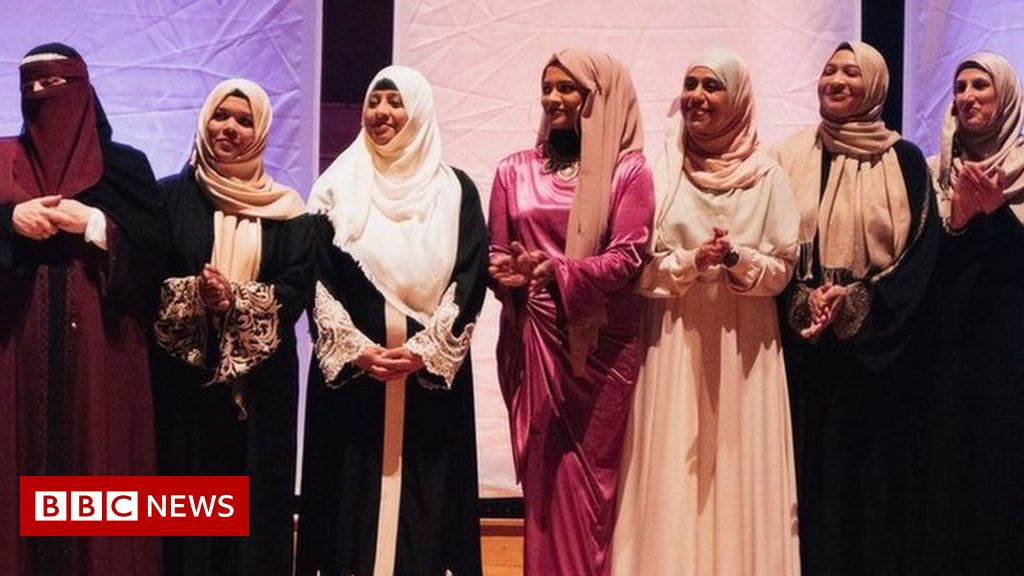
Covid: Swansea honours its pandemic heroes By Shazia Ali
BBC Wales News Published 26 March
Image source, c-bloc Productions Image caption, The Swansea Muslim Community Service: Aisha Rayhanna Amer, Momena Ali, Gulnahar Begum, Farhana Ali, Shehla Khan, Fatiha Rahman, Adeelah Rashid
It is two years since the first Covid lockdown in the UK.
In the midst of the pandemic, isolation and panic buying, many ordinary people went out of their way to help others in their communities.
Now tributes have been paid to Swansea’s unsung heroes, at a celebration honouring more than 100 people and organisations for going above and beyond for their city.
We spoke to some of them at the city’s Brangwyn Hall, and heard their inspiring and dramatic stories from the past two years.
‘I broke his letter box, but saved his life’
Image caption, Aisha Rayhanna Amer set up a charity with other local mums to buy and distribute food and other essentials, to help struggling families and vulnerable people
One group celebrated on the night was the Swansea Muslim Community Service – a group of mums who turned out to help neighbours, becoming a well-oiled machine.
The woman behind it all was Aisha Rayhanna Amer, who saved a life during one of her many food deliveries.
Aisha, a mother of seven, was supporting an elderly service user who lived alone.
“I knocked his door and I broke his letter box,” she said.
“I felt so guilty. I waited for him and no reply.
“I went back the next day, and his letter box hadn’t been fixed. I knew something wasn’t right. I called the police.”
The emergency services discovered the pensioner had probably suffered a stroke, and was stuck in his bedroom for three days. It was Aisha’s quick thinking that saved his life.
The group of Muslim women began their work after Aisha witnessed a mother of young children break down in tears in the middle of a supermarket, surrounded by panic buyers.
Organising themselves into administration, shopping, and referral teams, they distributed food packs and essentials seven days a week to vulnerable people.
‘Helping others helped my grieving process’
Image source, c-bloc Productions Image caption, “I thought, ‘what am I gonna do?’,” says John Davies
The evening also honoured the lives lost over the pandemic, with a moment of silence.
John Davies, 42, went into the pandemic having suffered the loss of his fiance, and became a single father of a two-year-old.
“I thought, ‘what am I gonna do?’,” he said. “I’ve lost such a big part of my life.
“By the time I reached out for help, we’d already entered the pandemic. Things were a lot more difficult to access than before. I couldn’t access the help that I needed.”
John went on to set up Chatterbox, a men’s mental health charity and a health walking group, to battle the effects of the pandemic.
“I wanna give as much as I can to the community. Yes I’m on benefits, but at the end of the day I give so much out in my time.”
“There’s been times since losing my fiance that the places I help set up have been my support groups, I can go there on my darkest days in my darkest moments, and I can come out of there feeling a lot better.”
‘If and when I needed things, they get here’
Image caption, “Restaurants have been providing food at a very low cost, some for free” says Dr Rashid Malik
Dr Rashid Malik, 83, shows no signs of slowing down.
The retired mechanical engineering professor has been closely connected to Swansea’s homeless community after setting up the Sameera Foundation, supporting vulnerable people across the world.
During Covid he provided food packs to those isolating, for NHS staff and Covid patients, and continued his efforts supporting Swansea’s homeless, people, arranging Christmas gifts and dinners for those moved into shelters.
“If you ask me, I’d say Welsh people are helpful,” he said.
“If and when I needed anything for homeless people, asylum seekers and refugees, I put it on my Facebook, and the items get here”.
Dr Malik praised Swansea’s ethnic minority community for their efforts.
“They’re very generous; the restaurants have been providing food at a very low cost, some for free. And Swansea Mosque provide food without any charge”.
‘We helped the people left behind’
Image caption, “These people were left behind,” says Alfred Oyekoya of BAME Mental Health Support
Alfred Oyekoya, the director of BAME Mental Health Support, said he was shocked by the neglect he witnessed.
The group’s volunteers supported international students, asylum seekers, and those new to the country.
“Of all the government support that was provided, these people were left behind,” he said.
“People were waiting for immigration feedback about their status. And immigration services were limited, so people were in limbo and that adds to the stress.
“They prefer to come to us because we won’t judge them. If they have overstayed, we tried to help vaccinate. It’s not our business if they’re undocumented.”
Organised by Swansea council the awards evening was supported by partners including BAME Mental Health Support, Swansea Bay University Health Board, Swansea Council for Voluntary Service, Swansea University and the Welsh government.
The recipients of the awards credited the people of Swansea for their generosity, for making their efforts a success.
“Just don’t give up on your community. Ever,” said Aisha.
“The Swansea community? 100% family.”







